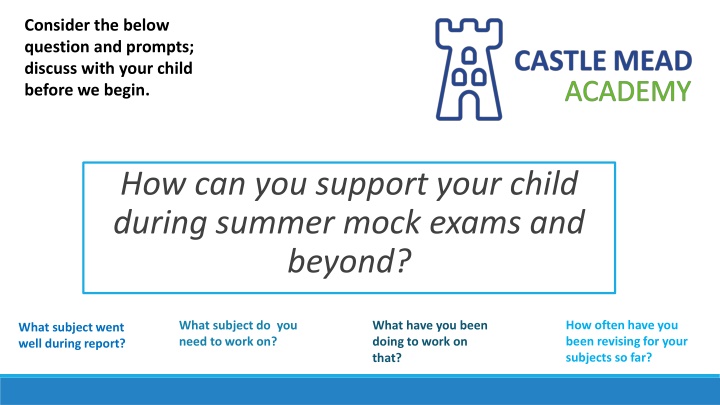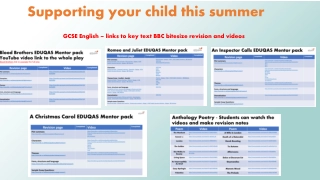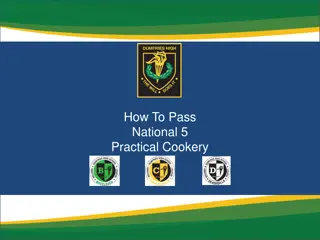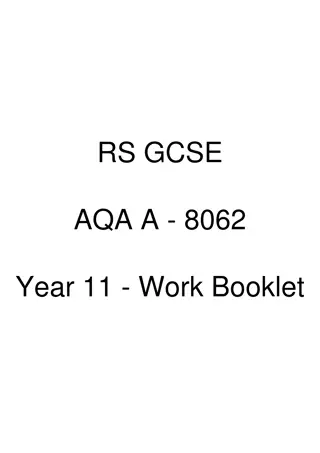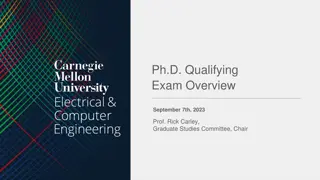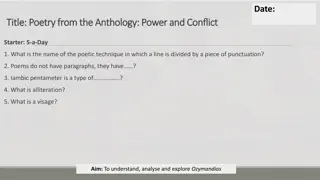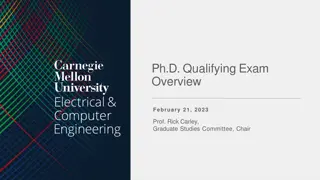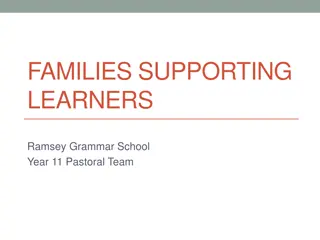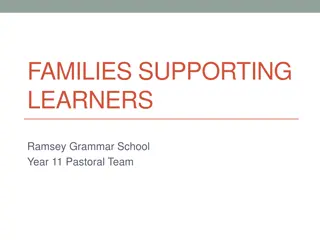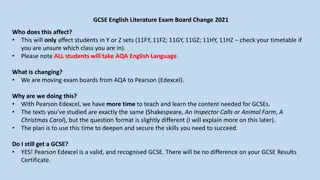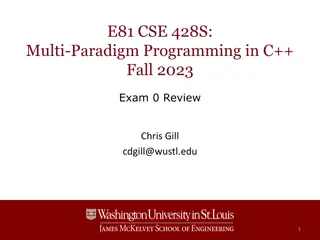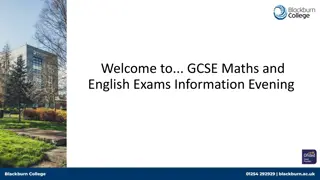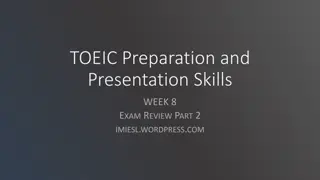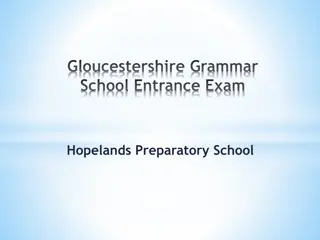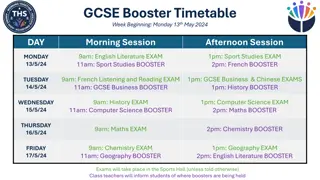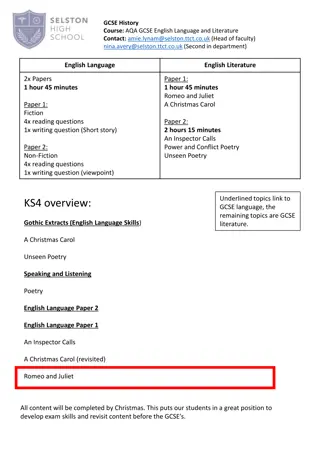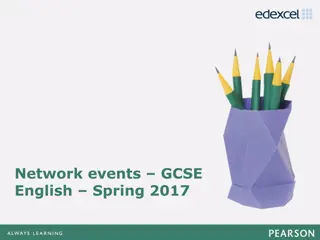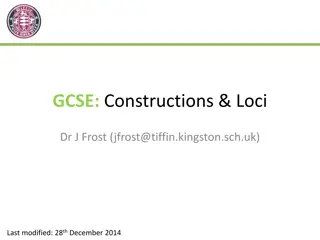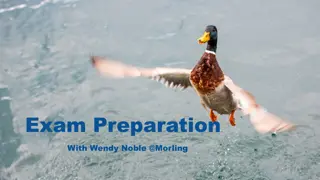Supporting Your Child Through GCSE Exam Preparation
As your child approaches their GCSE exams, it's crucial to provide them with support and guidance. From discussing revision strategies to identifying weaker subjects, this briefing covers key aspects to help your child excel in their exams and beyond. Valuable information on exam grades, minimum requirements, post-16 options, and more is shared to ensure a successful academic journey.
Download Presentation

Please find below an Image/Link to download the presentation.
The content on the website is provided AS IS for your information and personal use only. It may not be sold, licensed, or shared on other websites without obtaining consent from the author.If you encounter any issues during the download, it is possible that the publisher has removed the file from their server.
You are allowed to download the files provided on this website for personal or commercial use, subject to the condition that they are used lawfully. All files are the property of their respective owners.
The content on the website is provided AS IS for your information and personal use only. It may not be sold, licensed, or shared on other websites without obtaining consent from the author.
E N D
Presentation Transcript
Consider the below question and prompts; discuss with your child before we begin. How can you support your child during summer mock exams and beyond? How often have you been revising for your subjects so far? What subject do you need to work on? What have you been doing to work on that? What subject went well during report?
Family Briefing: Exam Preparation Part 1- Presentation in the theatre by: 1. Miss Thorley (Assistant Principal- Achievement) 2. Curriculum Leader of Core Subjects 3. Mrs Yazdani (Head of Scholar Wellbeing) Part 2- Carousel of option subjects Part 3- Return to the Dining Hall for summary and revision resources.
School Success for our scholars Families Scholars
May to June 2024: GCSE Exams Final YOUR NEXT STEP!!! February: Year 11 Final Mocks January: Year 11 final Parents Evening Achievement Report Year 11 Achievement Report Year 11 November mocks Half Term 1: Year 11 Parents Evening Post 16 Applications Fresh Start: Year 11 begins July: Final Year 10 Achievement Report July: End of Year Trip June: Year 10 Mock Exams CMA Journey CMA Journey April: Work Experience Week Three years of work at KS3 and Year 10 Term 1 and term 2
OLD GCSE GRADE NEW GCSE GRADE Top 20% of A/ A* will achieve a grade 9 9 A+/A* A 8 7 B/B+ 6 C+/B- 5 = new strong pass C 4= new standard pass E+/D 3 F/E G/F- 2 1
GCSE Facts Scholars will share their GCSE results for the rest of their life; when they apply to colleges, university, and any job! You need a minimum of grade 4 in Maths and English for most college courses, A Levels, apprenticeships, jobs and university degrees. For some A Levels you need a minimum of a grade 5 in Maths and English
Post 16- Next Steps Level 3 Vocational Course in Business: Minimum of 5 GCSES of grade 4-9, with a minimum of grade 4 in English and Maths Intermediate Apprenticeships (for example; hair and beauty, construction, business, accountancy): Minimum grade 4 in English and Maths Beauchamp City Sixth Form (A Levels)- 6 grade 5 s, including at least a grade 5 in English Literature or Language, and a grade 5 in Maths.
Importance of Grade 4 Scholars will have to resit their English and Maths if they do not get the minimum grade. Currently at CMA: 5 x Maths Lessons a week and 7 x English Lessons a week (English Literature and Language) If scholars have to resit, they will study this alongside their course. How can you help? Discuss with your child their current predicted grade for Maths and English. Speak to your child about the next steps/ any worries they have.
GCSE Facts Scholars who read books more than once a week gain higher results in all GCSE s compared to those who read less regularly. How can you help? Encourage your child to read in the evening and check they have a reading book.
Opportunities in school After school tutoring Masterclasses during Prep Academic Mentor Support Subject Drop In/ After school Sessions Staff Support
Summer Mock Exams Week commencing 5th June for a week in the sports hall. Access arrangements will be in place. Mrs Turner (SENDCO) will be available during the carousel in the dining hall if you have any questions. Why? Helps scholars to familiarise and understand the process for year 11 To help both the scholars and the teachers identify strengths and success and understand any gaps in knowledge.
Memory We take in information from all around us in a variety of ways. We see, hear, taste, smell and feel things that we are aware of and our brain notices.
Memory Once we ve noticed and used it we either forget the information or we learn it. If it has been learnt it is then stored in the long term memory.
Memory Over time we can remember information, bringing it back from long term memory to the working memory. If we don t re-use the information in a long time our brain s think we don t need it anymore and we will forget it.
What does it mean to learn? Learning is what happens when information is transferred into our long term memory. Information is processed and used in the working memory first but if we use it regularly enough the information passes to the long term memory. We want our knowledge to be in the long-term memory and the solution is retrieval and revision!
Practice make perfect? Daniel Willingham: - The unexpected finding from cognitive science is that practice does not make perfect. - Practice until you are perfect and you will be perfect only briefly. - What's necessary is sustained practice. - Sustained practice: regular, ongoing review of the 'target material'. This kind of practice past the point of mastery is necessary to meet any of these three important goals of instruction: acquiring facts and knowledge, learning skills, or becoming an expert.
How can you support your child? 1. Revision: little and often - Flashcards on the fridge - Test them/ get younger siblings to test them - Put their exam timetable up - Remove their technology when completing work/homework and give them a timer instead. 2. Organisation - Ensure they have all their year 10 books and resources - Make sure they are bringing equipment each day - Fill out the forms link if you need any equipment 3. Revision and Exam Prep Checklist - Collect a checklist on your way out and go through this with your child
Supporting your child during exam season
Exams are a stressful time for any young person Some common things you may notice as signs of struggling Feeling more tired than usual Angry or emotional outbursts Difficulty sleeping Changes in eating habits Not wanting to talk about things or becoming more closed off than usual
What can you do to help your child? Perspective Positive Praise
We believe that respect is mutual School? Stress? Mood? Exams? Scaling 1 Scaling 1 10 10 being the best OR most 10 being the best OR most 10 Worries? Sleep? Happiness ?
2 of my favorite go to apps for young people 2 of my favorite go to apps for young people
Carousel for Option Subjects (6.10-6.40pm) - History (0.16) - Geography (0.17) - Computer Science (0.18) - Textiles (0.28) Meet back in the dining hall for summary and revision resources! - Food Preparation and Nutrition (0.33) - Art (0.32) - Inclusion Support (Dining Hall)
